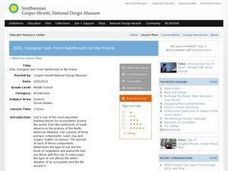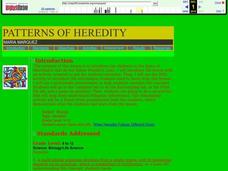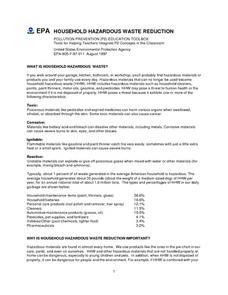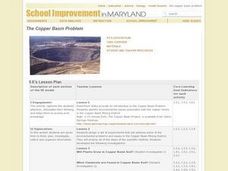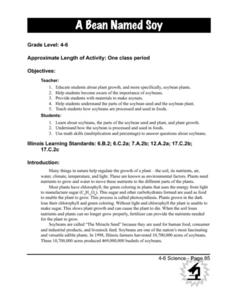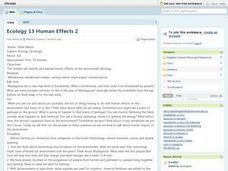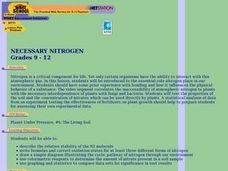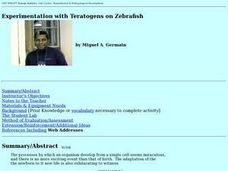Curated OER
Making a Mini Worm Habitat
Students explore the process of converting organic waste into usable fertilizer. They observe how living and nonliving things interact with one another by making a mini-worm habitat.
Curated OER
WHAT'S ORGANIC?
Young scholars explore how certain foods come to be certified "organic." They write the words "organic" and "synthetic" and given the definitions of each. Students are given dictionaries. They are asked: "What is organic food?" Young...
Curated OER
Why Eat Organic?
Ninth graders explore the concept of organic eating. In this environmental stewardship lesson, 9th graders compare and contrast organic foods with conventional foods and discuss the benefits of eating organic foods.
Curated OER
Plant Needs
Students explore the needs of plants. In this plants biology lesson, students work in groups to perform an experiment with tomato plants. Each group records observations in a journal, takes pictures, and interprets the...
Curated OER
Gardening with Your Students
By growing a class or school garden you can teach students about the environment, the life cycle of a plant, and healthy eating.
Curated OER
Soil, Designer Soil: From Rainforests to the Prairie
Students explore the role and importance of soil in the ecosystem. For this Science and Social Studies lesson, students complete an experiment using various kinds of soil and clay and then examine how soil has a direct impact on...
Curated OER
Patterns of Heredity
High schoolers describe the differences between incomplete dominance and codominant alleles, and between multiple alleles and polygenic inheritance. They describe how internal and external environments affect gene expression. They then...
Curated OER
Household Hazardous Waste Reduction
Students discover the different types of hazardous waste. They examine ways to dispose of the hazardous materials safely and without harming the environment.
Curated OER
Waste: Where Does It Come From? Where Does It Go?
Learners work together to identify sources of hazardous waste in their community. They discover the threat it poses to the environment. They examine how to properly dispose of hazardous waste as well.
Curated OER
The Copper Basin Problem
Learners view a video about how human actions impact the environment. They design a set of experiments to address some of the problems and issues raised by the video.
Curated OER
Vermicomposting
First graders investigate composting. For this biology lesson, 1st graders identify ways to use garbage as fertilizer. Students examine soil and compost matter as well as the role of worms in the dirt.
Curated OER
Organic Farming / Agriculture
Want an organic farming resource packed with experiments, background information, science fair projects, and topics of interest for further research? Here it is. Young environmental scientists can explore concepts involved in organic...
Curated OER
Soybeans: The Miracle Seed
Students discover why soybeans are called the "miracle seeds." They make their own soynuts and share other foods made from soybeans. They create a bulletin board of soybean products.
Salt River Project
How Do We Clean Polluted Water?
How do we clean up oil spills and other pollutants in the water? Explore water treatment strategies with a set of environmental science experiments. Groups remove oil from water, work with wastewater treatment, and perform a water...
Curated OER
Sustainable Agriculture
Students perform an experiment to find out if plants grow best when grown in soil with no fertilizer, with chemical fertilizers, or with compost that they have made themselves. Students discover how agriculture practices can benefit the...
Curated OER
THE FARMER CARES FOR THE LAND
Students will identify cause and effect relationships in issues relating to Agriculture and the environment.Ask students to describe what farmers do. Then ask students to define the word "environmentalist." Ask students if they have...
Curated OER
Inside the Egg, Hatching Chickens
Learners conduct an egg candling activity to show the life inside a fertile egg. Students discuss the needs the egg has of the hen, as well as similarities and differences between plants and animals. Learners complete a life cycle wheel...
Curated OER
Ecology 13 Human Effects 2
Learners identify and explain human effects on the environment. They explore the terms biodiversity, natural resources, ozone and global warming. After exploring all the terms , they connect technology to them and how it effects the...
Curated OER
Necessary Nitrogen
Learners view a video that presents the biogeochemical cycle of nitrogen. They compare types of soils and consider how different fertilizers affect soil composition.
Curated OER
Non-Point Source Pollution
Students study non-point source pollution. They research the concept of bio-degradation and/or Nutrients/Fertilizers and discuss how non-point source pollution impacts the environment. Afterwards, they participate in an interactive...
Curated OER
Genetic Disorders with Cultural Roots: International Insects
Young scholars recognize that certain populations have specific genetic disorders that could benefit or harm them in their environment, work out punnett square problems and infer offspring probabilities from results, and provide...
Curated OER
Recycling by Composting
Pupils examine the idea of recycling by composting. Using the internet, they research the benefits of composting to the environment. In groups, they collect numbers on how much food and yard waste is produced in their community. They...
Curated OER
Composting
Young scholars discover the concept of decomposition. They examine how it makes the soil more fertile and how it helps plants. They put a compost bin in their backyard and record their observations.
Curated OER
Experimentation with Teratogens on Zebrafish
Pupils compare mitosis and meiosis with regard to chromosome number in parent cells versus daughter cells, types of cells produced, total number of cells produced, and the number of divisions. In groups, identify and differentiate the...





